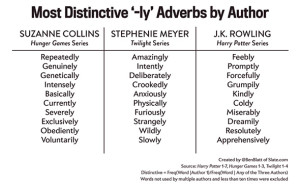A guest post by Jo Ann Schneider.
I was one of those kids that absolutely never wanted to get into trouble. Even when my friends called me a baby for not going with them to toilet paper the neighbor’s house, I would angrily stamp my foot and refuse to be a part of the game. Mostly because the thought of getting in trouble was more frightening than their wrath. Adults can be truly terrifying creatures.
As a young writer, I took every bit of writing advice I received with the seriousness of Spock. When I heard more experienced authors bitterly denounce the use of adverbs—specifically -ly words—I panicked and started diligently eliminating the traitorous words from my manuscripts.
Rewind and read that first bit again. Notice I shoved a whole lot of adverbs in there. Is it horrible? Doeth it offend thine eyes to readeth it?
Probably not—although there are some literary snobs out there that stopped reading two paragraphs ago. Bless their hearts. Sorry to offend.
I’m going to be honest, and don’t tell my ninth grade Language Arts teacher, because he would beat me for sure, but the first time I heard this piece of advice, I had to look up exactly what an adverb was. (Sheesh, exactly. Apparently I use these things all the time in my normal rambling.)
Try not to judge, ninth grade was a long time ago, and fourth grade even longer than that.
Just in case someone else has the same brain fart that I did, here’s the first definition that came up on Google.
Adverb:
a word or phrase that modifies or qualifies an adjective, verb, or other adverb or a word group, expressing a relation of place, time, circumstance, manner, cause, degree, etc. (e.g., gently, quite, then, there)
Wow, that’s stale. Let’s try the Adverb song. I’m not sure how to sing it, but I’m envisioning a rap beat here.
Adverbs add to a verb.
Lots of times they’re “L-Y” words,
They explain how, where or when.
Verbs are lonely without them.
Poor verbs! Don’t they get to have friends?
Back to my horrible opening to this post. There are more issues than just adverbs in this paragraph, please ignore the others.
I was one of those kids that absolutely never wanted to get into trouble.
-never is pretty absolute by itself, so the word absolutely is redundant and therefore not needed.
Even when my friends called me a baby for not going with them to toilet paper the neighbor’s house, I would angrily stamp my foot and refuse to be a part of the game.
-I suppose you could stamp your foot for an emotion besides anger, but the words stamp and refuse already give the reader my stance on the matter.
Mostly because the thought of getting in trouble was more frightening than their wrath.
-Ah, mostly. This is a style I use when I talk and write in my journal (I pity whomever decides to read it). This might be okay in a first person POV, when the character thinks like this. However, it’s not needed. You could nix the first two words of this sentence and get the same idea.
Adults can be truly terrifying creatures.
-This is beating around the bush. Just say that adults are terrifying. We all know it’s true.
Verbs like stamp or frown or run or hold or get or cry don’t really need help. They’re strong on their own. And if you’d like to add a little spice, show us what the character is doing. For instance, in a story the part about not going with my friends could be written like this:
I stamped my foot and glared. “I already told you I’m not coming.”
Simple. There’s an action and some dialogue to qualify it.
William Noble (Writer’s Digest) states:
It has become a cliché to use the adverbial tail time and time again. In addition to minimizing the dramatic effect of the action, it grinds on the reader’s ear (remember, readers “hear” as well as read). All those words ending in “-ly,” not doing much for the sentence, not creating much of a word picture … Who could blame readers for wondering why the words were there in the first place?
Now, I think people who say to never use an adverb are a bit fanatical. Those people are allowed to do whatever they want to their novels, if I’m allowed the same courtesy.
As with most superfluous things in the world, use them sparingly—like butter cream frosting and pepper. They’re spices, not the sauce.
However, there are a few authors who wield adverbs like a Skywalker brandishes their lightsaber. For instance, here are three examples from J.K. Rowling-
“Oh, no, sir,” said Hagrid quickly. Harry noticed that he gripped his pink umbrella very tightly as he spoke.
“I—don’t—want—” said Percy thickly, as the twins forced the sweater over his head…
“Fifty points each,” said Professor McGonagall, breathing heavily through her long, pointed nose.
For those who have read the Harry Potter books, this feels familiar. The tone is so unique, that I may have been able to take the names out and some of you could still guess which story these were from.
The voice of a character and the tone of a story are intertwined, and if your novel merits the use of adverbs, then go forth and type them.
Check out this little table that Slate.com put together:
Read each list of adverbs. Think about the stories they go with, and note the tone that they represent. Like good frosting, adverbs can be used to decorate an otherwise bland cake. But too much and the kids will be wired for hours, and you’ll want to beat someone.
About Jo Ann Schneider:
Jo Schneider grew up in Utah and Colorado, and wonders how people who live in flat places can tell where they’re going. In her sixteenth year, Jo went with her family to Europe. This spawned a travel bug that will never be satisfied. One of Jo’s goals is to travel to all seven continents–five down, two to go.
Perhaps the most challenging thing Jo has ever done (besides write novels) was stick with her Shaolin Kempo classes long enough to earn her black belt. Persistence, not an overabundance of mad skill, is what got her there, and she just keeps going back for more. An intervention may be in order at some point.
Being a geek at heart, Jo has always been drawn to science fiction and fantasy. She writes both, and hopes to introduce readers into worlds that wow them and characters that they can cheer for.
Blog: joannschneider.blogspot.com



Nice! And good points. I’m use adverbs wildly all the time and have to go back and reassess them later. 🙂
Pingback: When Rules get you into Trouble - The Fictorians